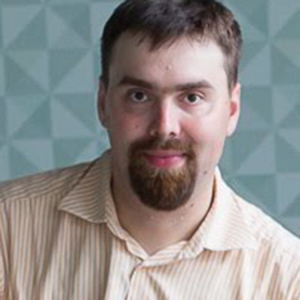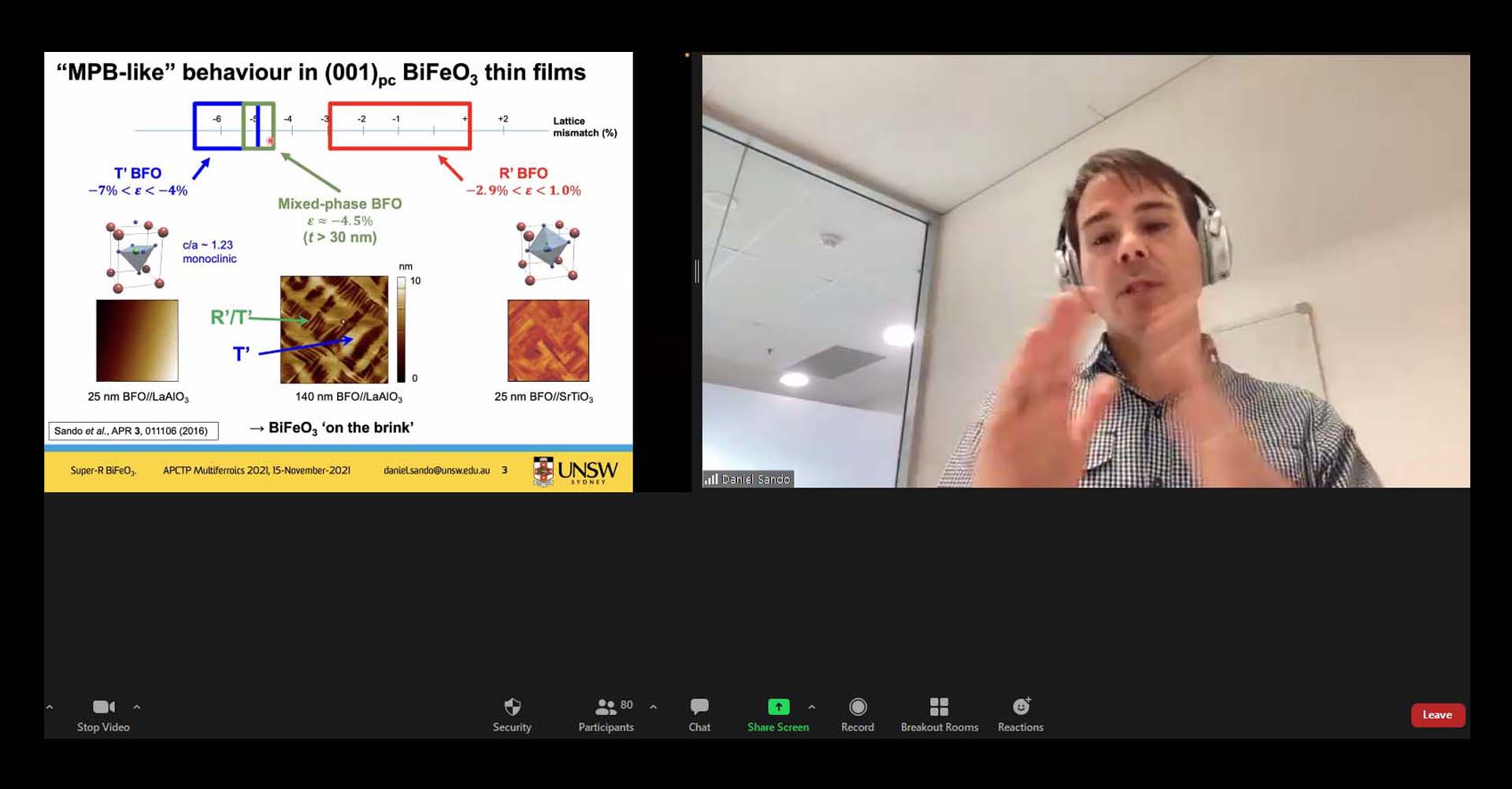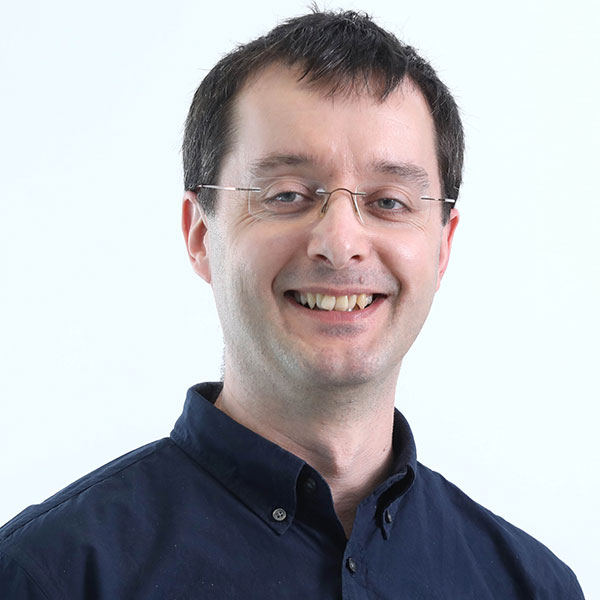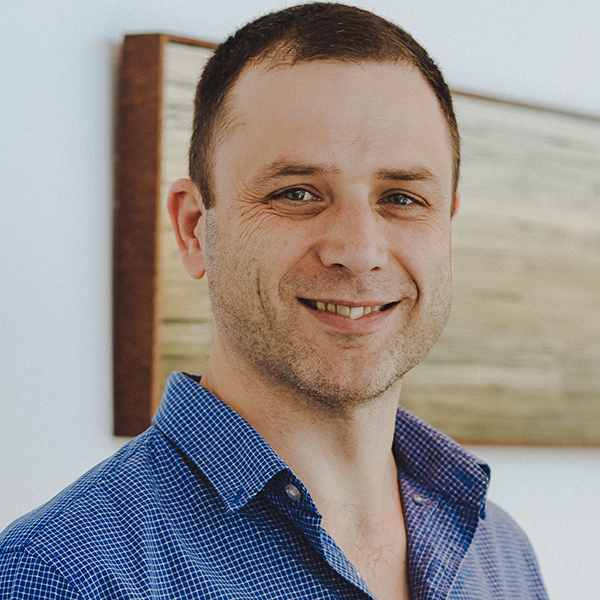Ongoing restrictions on international visits, which have traditionally sparked and fuelled research collaborations, have pushed FLEET to find new ways to connect.
Some positives have surfaced amid the negative impacts of Covid-19 travel bans on science collaboration, including the expansion in videoconferencing allowing researchers from geographically isolated regions to connect.
FLEET has brought three international conference series to Australia for the first time, hosting the International Conference on 2D Materials and Technologies (2018), International Conference on Spontaneous Coherence in Excitonic Systems (2020) and APTC Workshop on Multiferroics (2021).

Dr Dmitry Efimkin (Monash) leads the transpacific colloquia organising committee
US–Australian transpacific condensed-matter talks
In 2020, together with Centre partners at the Joint Quantum Institute (University of Maryland) and Monash University, FLEET inaugurated and hosted a new transpacific colloquium series presenting novel developments in condensed-matter and cold-atom physics to maintain and strengthen connections between physics communities in Australia and North America.
In 2021, the series hosted 14 colloquia (a significant increase from seven in 2020) with speakers from the following organisations in North America: California Institute of Technology, Columbia University, Harvard, McGill University, Ohio State University, Rutgers University, Stanford University and the University of Texas. Gender mix has been an ongoing focus, and over 40% of the speakers in 2021 were female.
The series’ organisation committee, led by FLEET Associate Investigator Dr Dmitry Efimkin (Monash), who directs series strategy, coordinates publicity and manages speaker recruitment seeking expertise specific to FLEET goals and research interests.
The colloquia covered topics from all FLEET research themes, including:
- Topological materials
- Moire superlattices
- Quantum stochastic resonance
- Dark matter challenges in solid state physics
- Non-Hermitian physics with exciton-polaritons
- Inverse-designed integrated photonics
- Domain/skyrmion-bound surface states on magnetic topological insulators
- Tunable edge states in vdW materials
- Quantum simulators
- Topological physics at light–matter interface
- Anomalous Hall effect in non-magnetic conductors
- Programmable quantum materials.
The 14 colloquia in 2021 attracted more than 530 Centre members and another 120 external participants.
The transpacific series represents one of Covid’s ‘silver linings’: an improvement in the way the Centre operates that has been embedded as the ‘new normal’ going forward.
Regardless of travel policies, the US–Australia Transpacific Colloquium series will continue, with alternative partners being sought to assure its long-term viability. The first four speakers in 2022 have already been confirmed.
FLEET provides a wide variety of seminars with leading experts that allow members to communicate and collaborate with some of the world's best in related subject areas.
FLEET member
survey response
Asia-Pacific workshop on multiferroics
With Australian–US links being strengthened by FLEET’s transpacific series, attention turned in 2021 to similarly fortifying links with important novel materials and physics research communities in Asia.
To build better links with the region, FLEET brought the Asia Pacific Center for Theoretical Physics (APCTP) conference series to Australia for the first time. In 2021, the conference focused on FLEET Theme 1 materials – specifically, multiferroic materials.
The 2021 Multiferroics conference built on FLEET’s previous success hosting major events: the International Conference on Two-Dimensional Materials and Technologies (ICON2D-Mat) in 2018 and Spontaneous Coherence in Excitonic Systems (ICSCE) in 2020, and co-hosting events in Germany and Italy.

FLEET Research Fellow Dr Daniel Sando presents at Multiferroics conference
Around 150 researchers from across the Asia-Pacific region joined FLEET online in November 2021 for the 12th APCTP Workshop on Multiferroics; 27 talks and a dozen posters covered materials that exhibit more than one type of built-in order (e.g. magnetism and ferroelectricity).
An extremely strong field of speakers included some of the biggest names in multiferroics from Australia, China, Japan, Korea, Singapore and the US.
FLEET Chief Investigator Prof Jan Seidel (UNSW) and FLEET-UNSW node coordinator Cecilia Bloise formed the core, local organising team.
Perennial ‘hot topics’ around the compatibility between ferroelectricity and magnetism were explored, including multiferroic domain engineering, electromagnon excitation and manipulation, and artificial multiferroic hetero-structures.
Recent additions include multiferroic van der Waals materials and topological defects such as domain walls and skyrmions in multiferroics.
As well as co-sponsorship between FLEET and the APCTP, government support for the event was received from the Australia–Korea Foundation, and publicity and communications support coordinated with the Association of Asia Pacific Physical Societies (AAPPS).

The multiferroic conference was an opportunity to explore the latest discoveries in multiferroic physics and materials, which is one of the most rapidly developing areas in condensed-matter research today. It was also a welcome opportunity to strengthen links with colleagues in Asia.
Prof Jan Seidel (UNSW) Conference Chair FLEET Chief Investigator

The cold-atoms series is coordinated by FLEET Chief Investigator Prof Matt Davis (UQ)
Trans-Tasman cold atoms seminar series
A monthly seminar series launched in 2021 unites cold atoms researchers from Australia and New Zealand.
Co-hosted by FLEET and the Centre of Excellence for Engineered Quantum Systems (EQUS), the series facilitates ongoing discussions and collaboration via Zoom, with physical attendance in individual institutions as Covid has allowed.
Seven seminars were convened in the first year of the series.